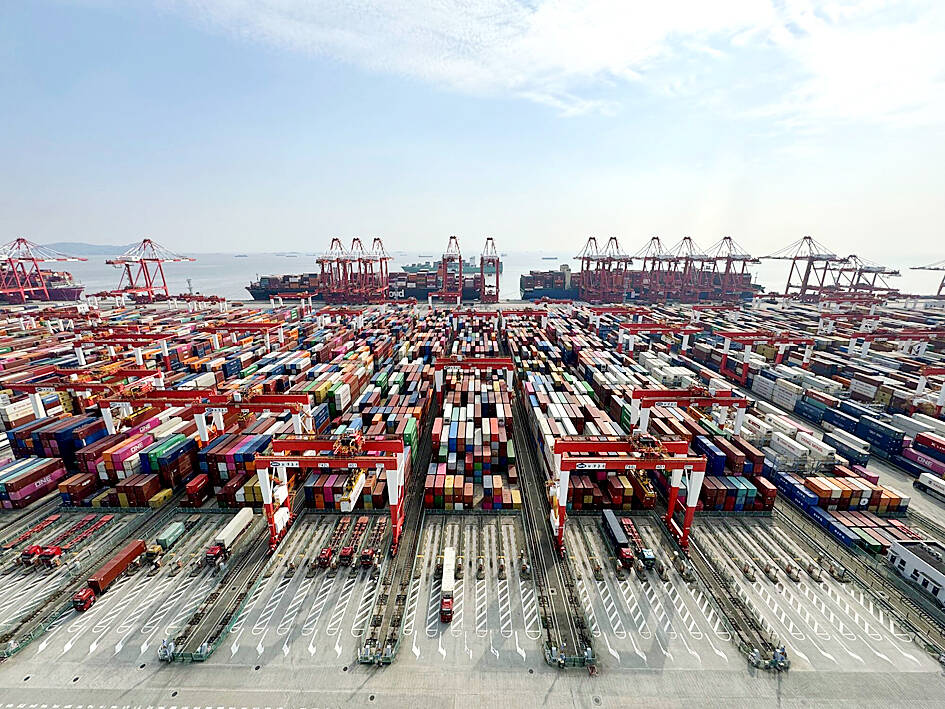China’s exports rose much less than expected last month, curbing a trade rebound that has been a bright spot for the slowing economy.
Exports climbed just 2.4 percent in US dollar terms from a year earlier, while imports inched up 0.3 percent, the Chinese General Administration of Customs said yesterday. That left a trade surplus of US$81.71 billion for the month.
Economists had forecast that exports would rise 6 percent, while imports would expand 0.8 percent.

Photo: Qilai Shen, Bloomberg
Chinese exports have been a rare source of strong growth for the economy this year, with the total value of shipments through last month the second-highest on record. However, imports have not grown as fast due to the slowdown in domestic growth, causing a record trade surplus and prompting more countries to raise barriers to Chinese goods.
Beijing has sought to bolster growth with a slew of stimulus measures, which could lift demand for imports and put pressure on prices to rise. The domestic economy has been in deflation since the second quarter of last year, which has pushed down export prices.
China has relied on manufacturing and exports to propel growth as the property sector slump hit consumer sentiment, with officials last week announcing plans for a significant fiscal stimulus package.
The country would issue special bonds to bolster banks, signaling an impending spending spree to shore up the property market and ease local government debt, Chinese Minister of Finance Lan Foan (藍佛安) said on Saturday.
China’s top banks on Saturday also said they would lower interest rates on existing mortgages from Friday next week.
“After accounting for changes in export prices and for seasonality, we estimate that export volumes softened a touch,” Capital Economics economist Zichun Huang (黃子春) said in a note yesterday.
“We think shipments will stay strong in the near term, supported by gains in export competitiveness. Further ahead, though, growing trade barriers are likely to become an increasing constraint,” Huang wrote.
Additional reporting by AFP

KEEPING UP: The acquisition of a cleanroom in Taiwan would enable Micron to increase production in a market where demand continues to outpace supply, a Micron official said Micron Technology Inc has signed a letter of intent to buy a fabrication site in Taiwan from Powerchip Semiconductor Manufacturing Corp (力積電) for US$1.8 billion to expand its production of memory chips. Micron would take control of the P5 site in Miaoli County’s Tongluo Township (銅鑼) and plans to ramp up DRAM production in phases after the transaction closes in the second quarter, the company said in a statement on Saturday. The acquisition includes an existing 12 inch fab cleanroom of 27,871m2 and would further position Micron to address growing global demand for memory solutions, the company said. Micron expects the transaction to

Nvidia Corp’s GB300 platform is expected to account for 70 to 80 percent of global artificial intelligence (AI) server rack shipments this year, while adoption of its next-generation Vera Rubin 200 platform is to gradually gain momentum after the third quarter of the year, TrendForce Corp (集邦科技) said. Servers based on Nvidia’s GB300 chips entered mass production last quarter and they are expected to become the mainstay models for Taiwanese server manufacturers this year, Trendforce analyst Frank Kung (龔明德) said in an interview. This year is expected to be a breakout year for AI servers based on a variety of chips, as

Global semiconductor stocks advanced yesterday, as comments by Nvidia Corp chief executive officer Jensen Huang (黃仁勳) at Davos, Switzerland, helped reinforce investor enthusiasm for artificial intelligence (AI). Samsung Electronics Co gained as much as 5 percent to an all-time high, helping drive South Korea’s benchmark KOSPI above 5,000 for the first time. That came after the Philadelphia Semiconductor Index rose more than 3 percent to a fresh record on Wednesday, with a boost from Nvidia. The gains came amid broad risk-on trade after US President Donald Trump withdrew his threat of tariffs on some European nations over backing for Greenland. Huang further

HSBC Bank Taiwan Ltd (匯豐台灣商銀) and the Taiwan High Prosecutors Office recently signed a memorandum of understanding (MOU) to enhance cooperation on the suspicious transaction analysis mechanism. This landmark agreement makes HSBC the first foreign bank in Taiwan to establish such a partnership with the High Prosecutors Office, underscoring its commitment to active anti-fraud initiatives, financial inclusion, and the “Treating Customers Fairly” principle. Through this deep public-private collaboration, both parties aim to co-create a secure financial ecosystem via early warning detection and precise fraud prevention technologies. At the signing ceremony, HSBC Taiwan CEO and head of banking Adam Chen (陳志堅)